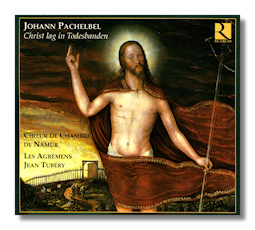
The Internet's Premier Classical Music Source
Related Links
- Pachelbel Reviews
- Latest Reviews
- More Reviews
-
By Composer
-
Collections
DVD & Blu-ray
Books
Concert Reviews
Articles/Interviews
Software
Audio
Search Amazon
Recommended Links
Site News
 CD Review
CD Review
Johann Pachelbel

Cantatas & Motets
- Toccata in C Major
- Jauchzet dem Herren (motet)
- Was Gott tut, das ist wohlgetan (cantata)
- Was Gott tut das ist wohlgetan (partita)
- Gott ist unser Zuversicht (motet)
- Christ lag in Todesbanden
- Christ lag in Todesbanden (cantata)
- Fantasia in G minor
- Jauchzet dem Herren (cantata)
Claire Lefilliâtre, soprano
Hans Jörg Mammel, tenor
David van Bouwel, organ
Chœur de Chambre de Namur
Les Agrémens/Jean Tubéry
Ricercar RIC255
The tercentenary of the death of Johann Pachelbel (1653-1706) didn't get the widespread attention it deserved. Pachelbel is often misperceived as a one-work composer (of the "Canon") – rather like Gregorio Allegri, who died the year before Pachelbel was born, known for his "Miserere" to the exclusion of much excellent music besides. It was indeed Pachelbel who perfected the south German organ school. Further – Pachelbel represents a remarkable line of continuity between the German polyphonic traditions with their strong Italian influence and the musical and liturgical frameworks within which (the young) Bach worked. One of Pachelbel's teachers, in Vienna, Johann Caspar Kerll, had studied with Carissimi and Frescobaldi; Pachelbel shared various localities and with older members of Bach's family; the genres he chose (partitas, motets and cantatas) were ones which Bach too was to make his own.
On the one hand, then, this collection of largely choral works by Pachelbel is welcome because it holds a unique and significant place in early Baroque musical history. On the other, it should be snapped up if you enjoy the Baroque at all because it is such sumptuously beautiful music. The CD comprises three cantatas (the longest pieces – lasting between 13 and 16 minutes each): Jauchzet dem Herren, Was Gott tut, das ist wohlgetan and Christ lag in Todesbanden, the organ pieces on which the latter two are based as well as motets, Jauchzet dem Herren again and Gott ist unser Zuversicht. The venerable Chamber Choir of Namur with Claire Lefilliâtre (soprano) and Hans Jörg Mammel (tenor) join Les Agrémens, the dozen or so strong instrumental ensemble founded by the Centre de Chant Choral in 1995 to support them in such repertoire. Jean Tubéry is both Director and one of two cornet players.
The music has the twin merits of being simple, straightforward, approachable on the one hand; and subtly understated on the other. What you see is what you get. The melodies support the plaintive and plangent words – listen to the way one of the disc's highlights, Was Gott tut, das ist wohlgetan, builds in intensity and never loses sight of the central tenet: an implicit trust in the poet's God based on a suspension of belief in anything but the best from him. The spring in the rhythms of the chorale-like cantata parallels such a suspension.
The organ pieces, played with a light yet businesslike touch by David Van Bouwel on the almost "fruity" Thomas de l'église de Gedinne instrument, convey, similarly, a sense of partnership as much as supplication with the divine. The motet, Gott ist unser Zuversicht, is more contrapuntal yet has a directness and momentum that does indeed point forward to Bach (think of Vom Himmel hoch in particular), though its abrupt ending may surprise on first hearing.
Christ lag in Todesbanden is an Easter celebration. Here too it is useful to have the organ theme for comparison. In this case it's a series of variations clearly influenced by earlier contrapuntal harpsichord techniques. Indeed the opening of the cantata [tr.7] could be by Byrd or one of the later English writers for consort. But the beauty and depth of the piece slowly unfold. And it's for good reason that the music seems to expand to occupy greater room than do earlier efforts in the genre: the works are divided into sections corresponding to the dramatic, descriptive and reflective stages and themes of the cantata and unobtrusively developing and enriching them. The combination of singers and supporting ensemble was also larger. the result – very creditably conveyed by Tubéry and his musicians. Their sense of structure is wonderful; the way they build the intensity with neither indulgence nor rhetoric is exemplary. Again the overall effect is one of great peace and satisfaction as the layers of reasoned joy are revealed… every word is clear; every musical phrase is made to count; every drop of detachment used to burnish the surface in order to see the shine of the substance beneath.
Jauchzet dem Herren is less spectacular, less penetrating. Nevertheless it lacks neither poignancy nor variety. The singing and playing underlines both the definition and brilliance, though, of what for Pachelbel was obviously a cornerstone of his belief:
Es folg mir jeder auf der Bahn
und jauchze, wer da jauchzen kann,
Gott nimmt sich unser an.
The recording is clear, if a little dry; the booklet has interesting supporting material and the full texts in German, with French and English. The appeal of these well-conceived and imaginatively-played pieces stretches well beyond their historical interest. Pachelbel was less ambitious, perhaps, than his contemporaries; certainly than those he so clearly influenced. His lines are less ornate, the structure and statement of his melodic and harmonic ideas less intricate. But neither banal nor commonplace. Ultimately, this is very satisfying music played without pretense yet with great style. Recommended without hesitation – especially since little of this repertoire exists on CD already; and even less performed to this very high standard… refreshing, accurate, expressive, compelling.
Copyright © 2008, Mark Sealey




















